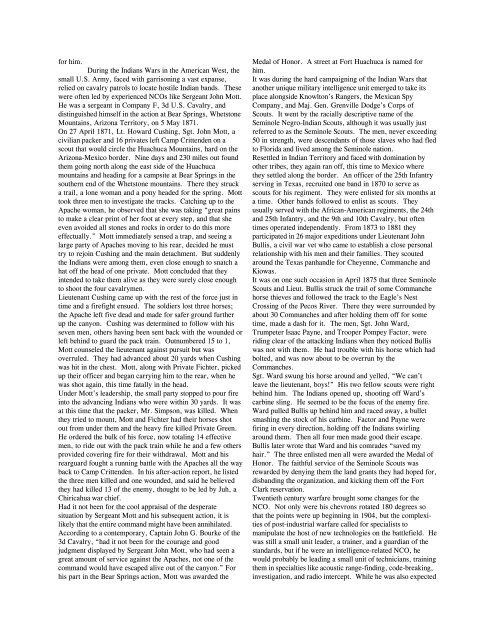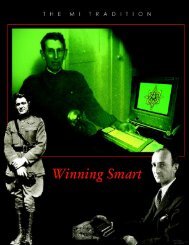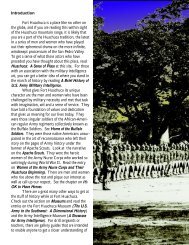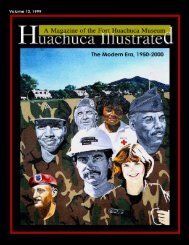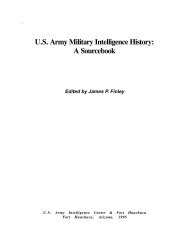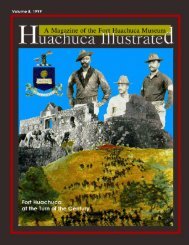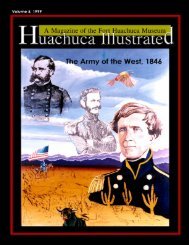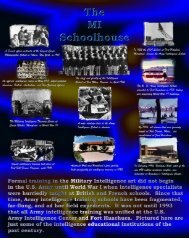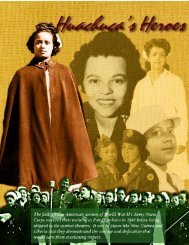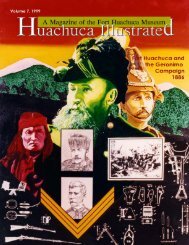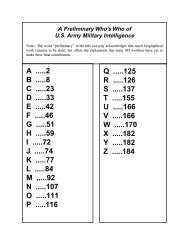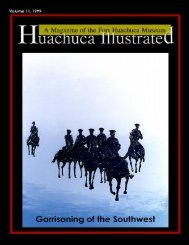NCO's in MI - Fort Huachuca - U.S. Army
NCO's in MI - Fort Huachuca - U.S. Army
NCO's in MI - Fort Huachuca - U.S. Army
You also want an ePaper? Increase the reach of your titles
YUMPU automatically turns print PDFs into web optimized ePapers that Google loves.
for him.<br />
Dur<strong>in</strong>g the Indians Wars <strong>in</strong> the American West, the<br />
small U.S. <strong>Army</strong>, faced with garrison<strong>in</strong>g a vast expanse,<br />
relied on cavalry patrols to locate hostile Indian bands. These<br />
were often led by experienced NCOs like Sergeant John Mott.<br />
He was a sergeant <strong>in</strong> Company F, 3d U.S. Cavalry, and<br />
dist<strong>in</strong>guished himself <strong>in</strong> the action at Bear Spr<strong>in</strong>gs, Whetstone<br />
Mounta<strong>in</strong>s, Arizona Territory, on 5 May 1871.<br />
On 27 April 1871, Lt. Howard Cush<strong>in</strong>g, Sgt. John Mott, a<br />
civilian packer and 16 privates left Camp Crittenden on a<br />
scout that would circle the <strong>Huachuca</strong> Mounta<strong>in</strong>s, hard on the<br />
Arizona-Mexico border. N<strong>in</strong>e days and 230 miles out found<br />
them go<strong>in</strong>g north along the east side of the <strong>Huachuca</strong><br />
mounta<strong>in</strong>s and head<strong>in</strong>g for a campsite at Bear Spr<strong>in</strong>gs <strong>in</strong> the<br />
southern end of the Whetstone mounta<strong>in</strong>s. There they struck<br />
a trail, a lone woman and a pony headed for the spr<strong>in</strong>g. Mott<br />
took three men to <strong>in</strong>vestigate the tracks. Catch<strong>in</strong>g up to the<br />
Apache woman, he observed that she was tak<strong>in</strong>g “great pa<strong>in</strong>s<br />
to make a clear pr<strong>in</strong>t of her foot at every step, and that she<br />
even avoided all stones and rocks <strong>in</strong> order to do this more<br />
effectually.” Mott immediately sensed a trap, and see<strong>in</strong>g a<br />
large party of Apaches mov<strong>in</strong>g to his rear, decided he must<br />
try to rejo<strong>in</strong> Cush<strong>in</strong>g and the ma<strong>in</strong> detachment. But suddenly<br />
the Indians were among them, even close enough to snatch a<br />
hat off the head of one private. Mott concluded that they<br />
<strong>in</strong>tended to take them alive as they were surely close enough<br />
to shoot the four cavalrymen.<br />
Lieutenant Cush<strong>in</strong>g came up with the rest of the force just <strong>in</strong><br />
time and a firefight ensued. The soldiers lost three horses;<br />
the Apache left five dead and made for safer ground further<br />
up the canyon. Cush<strong>in</strong>g was determ<strong>in</strong>ed to follow with his<br />
seven men, others hav<strong>in</strong>g been sent back with the wounded or<br />
left beh<strong>in</strong>d to guard the pack tra<strong>in</strong>. Outnumbered 15 to 1,<br />
Mott counseled the lieutenant aga<strong>in</strong>st pursuit but was<br />
overruled. They had advanced about 20 yards when Cush<strong>in</strong>g<br />
was hit <strong>in</strong> the chest. Mott, along with Private Fichter, picked<br />
up their officer and began carry<strong>in</strong>g him to the rear, when he<br />
was shot aga<strong>in</strong>, this time fatally <strong>in</strong> the head.<br />
Under Mott’s leadership, the small party stopped to pour fire<br />
<strong>in</strong>to the advanc<strong>in</strong>g Indians who were with<strong>in</strong> 30 yards. It was<br />
at this time that the packer, Mr. Simpson, was killed. When<br />
they tried to mount, Mott and Fichter had their horses shot<br />
out from under them and the heavy fire killed Private Green.<br />
He ordered the bulk of his force, now total<strong>in</strong>g 14 effective<br />
men, to ride out with the pack tra<strong>in</strong> while he and a few others<br />
provided cover<strong>in</strong>g fire for their withdrawal. Mott and his<br />
rearguard fought a runn<strong>in</strong>g battle with the Apaches all the way<br />
back to Camp Crittenden. In his after-action report, he listed<br />
the three men killed and one wounded, and said he believed<br />
they had killed 13 of the enemy, thought to be led by Juh, a<br />
Chiricahua war chief.<br />
Had it not been for the cool appraisal of the desperate<br />
situation by Sergeant Mott and his subsequent action, it is<br />
likely that the entire command might have been annihilated.<br />
Accord<strong>in</strong>g to a contemporary, Capta<strong>in</strong> John G. Bourke of the<br />
3d Cavalry, “had it not been for the courage and good<br />
judgment displayed by Sergeant John Mott, who had seen a<br />
great amount of service aga<strong>in</strong>st the Apaches, not one of the<br />
command would have escaped alive out of the canyon.” For<br />
his part <strong>in</strong> the Bear Spr<strong>in</strong>gs action, Mott was awarded the<br />
Medal of Honor. A street at <strong>Fort</strong> <strong>Huachuca</strong> is named for<br />
him.<br />
It was dur<strong>in</strong>g the hard campaign<strong>in</strong>g of the Indian Wars that<br />
another unique military <strong>in</strong>telligence unit emerged to take its<br />
place alongside Knowlton’s Rangers, the Mexican Spy<br />
Company, and Maj. Gen. Grenville Dodge’s Corps of<br />
Scouts. It went by the racially descriptive name of the<br />
Sem<strong>in</strong>ole Negro-Indian Scouts, although it was usually just<br />
referred to as the Sem<strong>in</strong>ole Scouts. The men, never exceed<strong>in</strong>g<br />
50 <strong>in</strong> strength, were descendants of those slaves who had fled<br />
to Florida and lived among the Sem<strong>in</strong>ole nation.<br />
Resettled <strong>in</strong> Indian Territory and faced with dom<strong>in</strong>ation by<br />
other tribes, they aga<strong>in</strong> ran off, this time to Mexico where<br />
they settled along the border. An officer of the 25th Infantry<br />
serv<strong>in</strong>g <strong>in</strong> Texas, recruited one band <strong>in</strong> 1870 to serve as<br />
scouts for his regiment. They were enlisted for six months at<br />
a time. Other bands followed to enlist as scouts. They<br />
usually served with the African-American regiments, the 24th<br />
and 25th Infantry, and the 9th and 10th Cavalry, but often<br />
times operated <strong>in</strong>dependently. From 1873 to 1881 they<br />
participated <strong>in</strong> 26 major expeditions under Lieutenant John<br />
Bullis, a civil war vet who came to establish a close personal<br />
relationship with his men and their families. They scouted<br />
around the Texas panhandle for Cheyenne, Commanche and<br />
Kiowas.<br />
It was on one such occasion <strong>in</strong> April 1875 that three Sem<strong>in</strong>ole<br />
Scouts and Lieut. Bullis struck the trail of some Commanche<br />
horse thieves and followed the track to the Eagle’s Nest<br />
Cross<strong>in</strong>g of the Pecos River. There they were surrounded by<br />
about 30 Commanches and after hold<strong>in</strong>g them off for some<br />
time, made a dash for it. The men, Sgt. John Ward,<br />
Trumpeter Isaac Payne, and Trooper Pompey Factor, were<br />
rid<strong>in</strong>g clear of the attack<strong>in</strong>g Indians when they noticed Bullis<br />
was not with them. He had trouble with his horse which had<br />
bolted, and was now about to be overrun by the<br />
Commanches.<br />
Sgt. Ward swung his horse around and yelled, “We can’t<br />
leave the lieutenant, boys!” His two fellow scouts were right<br />
beh<strong>in</strong>d him. The Indians opened up, shoot<strong>in</strong>g off Ward’s<br />
carb<strong>in</strong>e sl<strong>in</strong>g. He seemed to be the focus of the enemy fire.<br />
Ward pulled Bullis up beh<strong>in</strong>d him and raced away, a bullet<br />
smash<strong>in</strong>g the stock of his carb<strong>in</strong>e. Factor and Payne were<br />
fir<strong>in</strong>g <strong>in</strong> every direction, hold<strong>in</strong>g off the Indians swirl<strong>in</strong>g<br />
around them. Then all four men made good their escape.<br />
Bullis later wrote that Ward and his comrades “saved my<br />
hair.” The three enlisted men all were awarded the Medal of<br />
Honor. The faithful service of the Sem<strong>in</strong>ole Scouts was<br />
rewarded by deny<strong>in</strong>g them the land grants they had hoped for,<br />
disband<strong>in</strong>g the organization, and kick<strong>in</strong>g them off the <strong>Fort</strong><br />
Clark reservation.<br />
Twentieth century warfare brought some changes for the<br />
NCO. Not only were his chevrons rotated 180 degrees so<br />
that the po<strong>in</strong>ts were up beg<strong>in</strong>n<strong>in</strong>g <strong>in</strong> 1904, but the complexities<br />
of post-<strong>in</strong>dustrial warfare called for specialists to<br />
manipulate the host of new technologies on the battlefield. He<br />
was still a small unit leader, a tra<strong>in</strong>er, and a guardian of the<br />
standards, but if he were an <strong>in</strong>telligence-related NCO, he<br />
would probably be lead<strong>in</strong>g a small unit of technicians, tra<strong>in</strong><strong>in</strong>g<br />
them <strong>in</strong> specialties like acoustic range-f<strong>in</strong>d<strong>in</strong>g, code-break<strong>in</strong>g,<br />
<strong>in</strong>vestigation, and radio <strong>in</strong>tercept. While he was also expected


